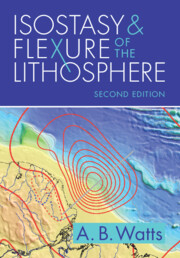Book contents
- Isostasy and Flexure of the Lithosphere
- Isostasy and Flexure of the Lithosphere
- Copyright page
- Dedication
- Contents
- Preface to the Second Edition
- Preface to the First Edition
- Acknowledgements
- Notation
- 1 The Development of the Concept of Isostasy
- 2 Isostasy and Flexure of the Lithosphere
- 3 Theory of Elastic Plates
- 4 Geological Examples of the Flexure Model of Isostasy
- 5 Isostatic Response Functions
- 6 Isostasy and the Physical Nature of the Lithosphere
- 7 Isostasy and the Origin of Geological Features in the Continents and Oceans
- 8 Isostasy and the Terrestrial Planets
- References
- Index
6 - Isostasy and the Physical Nature of the Lithosphere
Published online by Cambridge University Press: 28 September 2023
- Isostasy and Flexure of the Lithosphere
- Isostasy and Flexure of the Lithosphere
- Copyright page
- Dedication
- Contents
- Preface to the Second Edition
- Preface to the First Edition
- Acknowledgements
- Notation
- 1 The Development of the Concept of Isostasy
- 2 Isostasy and Flexure of the Lithosphere
- 3 Theory of Elastic Plates
- 4 Geological Examples of the Flexure Model of Isostasy
- 5 Isostatic Response Functions
- 6 Isostasy and the Physical Nature of the Lithosphere
- 7 Isostasy and the Origin of Geological Features in the Continents and Oceans
- 8 Isostasy and the Terrestrial Planets
- References
- Index
Summary
There is evidence that oceanic Te corresponds approximately to the thickness of the seismogenic layer as inferred from well-located intra-plate earthquakes. However, Te and the seismogenic layer thickness are not the same parameter: Te is the integrated thickness of the lithosphere that behaves essentially elastically on long geological timescales, while the seismogenic layer thickness defines the depth to which faulting and earthquakes occur.
In the continents, no simple relationship exists between Te and the thickness of the seismogenic layer. The problem is that while continental Te shows a wide range of values, most earthquakes occur in the uppermost 25 km of the continental lithosphere. Most low Te estimates, however, occur in rifts and active orogenic belts where there is a generally good agreement between Te and the thickness of the seismogenic layer. The main discrepancy is in cratonic regions, where earthquakes are limited to depths of 25 km and peak at 10–15 km, in contrast to the Te data that show no obvious peak and a range of values of 0–120 km.
Keywords
- Type
- Chapter
- Information
- Isostasy and Flexure of the Lithosphere , pp. 273 - 340Publisher: Cambridge University PressPrint publication year: 2023

